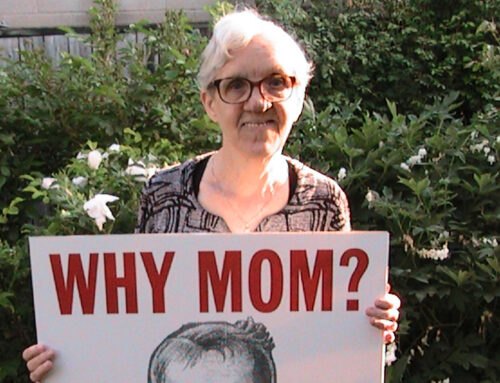| Fighting the Ontario injunction, which prohibits pro-life activity from taking place outside the province’s abortuaries, should be addressed at the political level rather than the legal one, said Judge H. Porter in the trial of Linda Gibbons, Emidio Galea, and Bernard Crawley.
The three pro-life witnesses were tried on July 21 in the provincial court at College Park in Toronto. Gibbons and Galea, both of Toronto, and Crawley, from Kitchener, were all charged with obstructing a peace officer. They were arrested on the morning of June 9 for demonstrating in front of the Scott abortuary.
High-profile U.S. lawyer John Broderick represented Gibbons at the trial. He has a long history with the pro-life movement, and has defended U.S. sidewalk counsellor Joan Andrews-Bell. His assistant, Christopher Bellotti, a law student, defended Galea. Broderick argued that because the injunction has been in place for almost five years, but was never intended to be permanent, it must now be considered invalid. The August 1994 court order granting the injunction refers to the measure as a temporary emergency provision. At the trial date, Galea had already served time in pre-trial imprisonment for refusing to agree to stay away from the abortuaries in Toronto. Crawley however, was released on these terms in early June. Both had no prior criminal record and were drawn to pray outside the clinic because they had recently become more concerned about the evils of abortion. “I met Linda at the March for Life in Ottawa and I knew it was time to join her,” Crawley toldThe Interim. The Crown attorney argued that despite the desire of the defendants to obey their consciences, disobeying the injunction is not the proper way to go about it. Judge Porter stated that though they may wish to challenge the injunction itself, they won’t be able to get very far through the court system, which is not set up to make laws, but rather to interpret them. Gibbons, as always, remained silent throughout the hearing. Galea and Crawley were both given an opportunity to speak during the sentencing phase of the trial. Galea spoke about his belief in the unconstitutionality of the injunction. He said he felt that the only way he could make a genuine statement for the unborn was to give up his freedom by being imprisoned. “I kept looking around saying, somebody should do something about this,” Crawley told the court. “The reason I was there was to invoke God’s help to clear up this situation of abortion.” Broderick gave a stirring testimony regarding the painful effects abortion has had on our society, especially upon women’s lives. He said that the three defendants had the “highest form of charity” because they had given up their freedom for unborn babies, whom they have never even seen. |

 Gibbons was sentenced to three more months in jail after serving 43 days prior to the trial. Galea was given a conditional discharge, provided that he agree to stay at least 100 metres away from any abortion clinic in the Greater Toronto Area for the next year. Crawley was given a similar probationary sentence.
Gibbons was sentenced to three more months in jail after serving 43 days prior to the trial. Galea was given a conditional discharge, provided that he agree to stay at least 100 metres away from any abortion clinic in the Greater Toronto Area for the next year. Crawley was given a similar probationary sentence.


